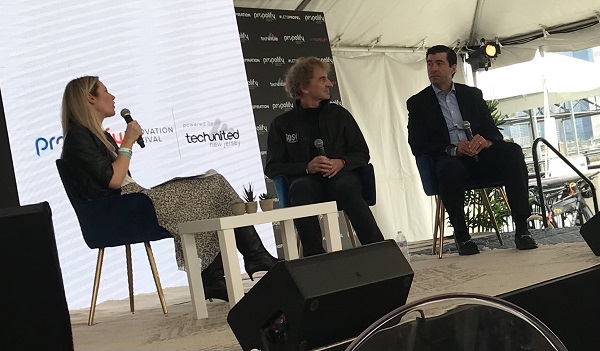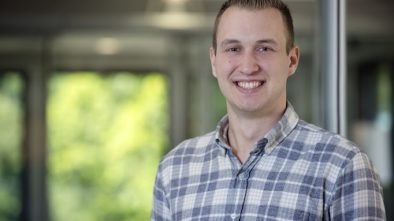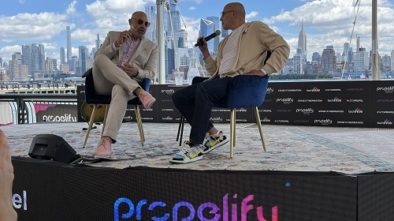SOSV’s HAX Accelerator to Make Newark Premier Hard-Tech Hub, Propelify Speakers Say
- Hundreds of millions of dollars in investments.
- One hundred startups over the next five years.
- Some 2,500 jobs over the next 10 years.
- $10 million black and Latino seed funding
- And one excited city.
Newark will become the premier hard-tech hub in the United States after Princeton-based venture capital firm SOSV establishes the U.S. headquarters for its HAX tech accelerator there, officials involved in the agreement said during the annual Propelify Innovation Festival in Hoboken.
“It takes a village to raise a child, but it doesn’t take a village to build a startup. It actually takes a city,” said Sean O’Sullivan, founder and managing general partner of SOSV. “The [supply] chain. The suppliers. The job markets. The universities. It takes a city, and Newark is that really big city.”
In September, officials announced that Newark was named as the winning city in SOSV’s competitive nationwide location search for the coveted HAX accelerator. O’Sullivan and Tim Sullivan, CEO of the New Jersey Economic Development Authority (NJEDA), discussed the agreement on Propelify’s Stage of Inspiration.
The NJEDA and SOSV intend to form a new entity called “HAX LLC” to bring SOSV’s HAX hard-tech startup development program to Newark.
The first companies could be working at the accelerator as soon as spring 2022, officials said.
“We want to be the most diverse and inclusive innovation ecosystem in America. A lot of that is easier said than done, but we want to make that a priority,” Sullivan said.
“New Jersey is reclaiming its leadership position in innovation and entrepreneurship, but what we haven’t seen in New Jersey are companies going from one or two people to 1,000 or 2,000 people or 10,000 or 20,000 people,” he said.
The NJEDA is planning to invest $25 million in the effort, officials have said. SOSV will commit to taking 100 companies through the HAX program over the next five years and to investing $25 million in the startups. Down the road, these companies may receive up to $50 million as follow-on funding from SOSV as they grow, according to officials and information about the plans.
The Newark HAX accelerator will combine science and engineering to focus on industry-level innovation in areas related to the reindustrialization and decarbonization of the U.S., including healthcare, industrial and climate tech. HAX is known for accelerating “tough tech” startups.
Also in the mix will be a $10 million black and Latino seed fund — a first in the nation, O’Sullivan said. “SOSV is very intentional about cultivating female founders and female-run businesses, and [businesses] operated by women of color.”
“This is going to be absolutely the biggest HAX location in the world, and it will be funding many, many tens of millions [of dollars for] these companies initially, and many hundreds over time,’’ said O’Sullivan.
O’Sullivan noted that SOSV invests about $100 million a year, infusing the funds into 130 new companies from a pool of 8,000 companies that apply to get into their programs.
“About 40 of those companies are from all over the world, and at least 20 of those will be based in our New Jersey location,” he said.
HAX plans to lease up to 60,000 square feet of space in Newark, including space for 200 founders and staff, as well as fabrication-prototyping workshops.
The HAX announcement comes at an interesting time. “After 73 years of manufacturing dropping in the United States, why would we be investing in what is a falling knife?” O’Sullivan asked.
“These things come in cycles. We wised up during COVID. There’s too much offshoring and outsourcing, [resulting in] too much fragility in our supply chain. We are all seeing it here today, and you’re seeing it in the rising costs of automobiles. Everybody’s facing these supply chain problems. We can’t even make masks. We’ve outsourced all these jobs,” he said.
“So, that trend effectively stopped slightly before COVID. People were recognizing all the problems, and we were also seeing the rising costs of manufacturing internationally,” he said.
“Another unstoppable megatrend is just how devices of all kinds, whether it’s a tennis racket [or something else] being connected to the internet, and telling you how to play tennis better, or if it’s a heartbeat monitor, or something monitoring the pulmonary system reading after COVID, or producing clean hydrogen or whatever the technology is, these things are increasingly becoming cloud based.”
“Every physical device has been reinvented for these new patterns,” Sullivan added. “How we work and how we can keep going forward — everything — has to be thrown out and reinvented again.”




